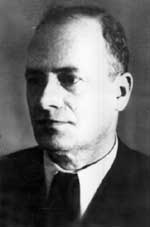نيكولا كيروف (بالبلغارية: Никола Киров) هو كاتب بلغاري، ولد في 28 يونيو 1880 في Kruševo في شمال مقدونيا، وتوفي في 1962 في صوفيا في بلغاريا.[2][3][4]
| نيكولا كيروف | |
|---|---|
| معلومات شخصية | |
| الميلاد | 28 يونيو 1880 |
| الوفاة | سنة 1962 (81–82 سنة)[1] صوفيا |
| مواطنة |  بلغاريا بلغاريا |
| الحياة العملية | |
| المهنة | كاتب |
 موسوعة الأدب موسوعة الأدب |
|
مراجع
- معرف أوجه تطبيق مصطلح الموضوع: http://id.worldcat.org/fast/276370 — باسم: Nikola Kirov Majski — تاريخ الاطلاع: 9 أكتوبر 2017
- Николов, Борис Й. Вътрешна македоно-одринска революционна организация. Войводи и ръководители (1893-1934). Биографично-библиографски справочник, София, 2001, стр. 76 - 77.
- The origins of the official Macedonian national narrative are to be sought in the establishment in 1944 of the Yugoslav Republic of Macedonia. This open acknowledgment of the Macedonian national identity led to the creation of a revisionist historiography whose goal has been to affirm the existence of the Macedonian nation through the history. Macedonian historiography is revising a considerable part of ancient, medieval, and modern histories of the Balkans. Its goal is to claim for the Macedonian peoples a considerable part of what the Greeks consider Greek history and the Bulgarians Bulgarian history. The claim is that most of the Slavic population of Macedonia in the 19th and first half of the 20th century was ethnic Macedonian. For more see: Victor Roudometof, Collective Memory, National Identity, and Ethnic Conflict: Greece, Bulgaria, and the Macedonian Question, Greenwood Publishing Group, 2002, (ردمك ), p. 58; Victor Roudometof, Nationalism and Identity Politics in the Balkans: Greece and the Macedonian Question in Journal of Modern Greek Studies 14.2 (1996) 253-301.
- Yugoslav Communists recognized the existence of a Macedonian nationality during WWII to quiet fears of the Macedonian population that a communist Yugoslavia would continue to follow the former Yugoslav policy of forced Serbianization. Hence, for them to recognize the inhabitants of Macedonia as Bulgarians would be tantamount to admitting that they should be part of the Bulgarian state. For that the Yugoslav Communists were most anxious to mold Macedonian history to fit their conception of Macedonian consciousness. The treatment of Macedonian history in Communist Yugoslavia had the same primary goal as the creation of the Macedonian language: to de-Bulgarize the Macedonian Slavs and to create a separate national consciousness that would inspire identification with Yugoslavia. For more see: Stephen E. Palmer, Robert R. King, Yugoslav communism and the Macedonian question, Archon Books, 1971, (ردمك ), Chapter 9: The encouragement of Macedonian culture.
وصلات خارجية
- نيكولا كيروف على موقع المكتبة المفتوحة (الإنجليزية)
